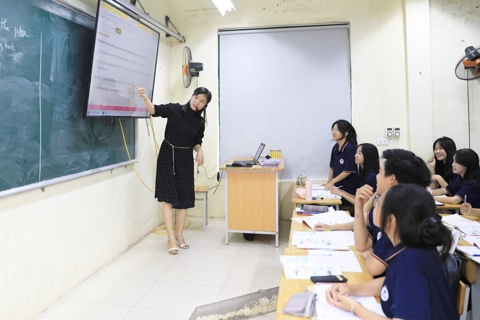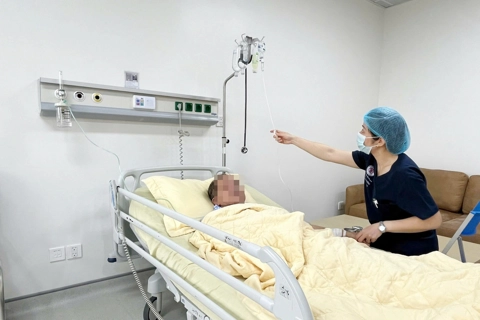Social Affairs
AI application to create evolution in healthcare sector
Feb 23, 2019 / 12:00 PM
In 2018, AI market in healthcare reached more than US$2 billion, over US$36 billion in 2025, accounting for 20% of the entire AI market.
The application of Artificial Intelligence (AI) to exploit electronic medical data will create an evolution in healthcare sector, said Prof. Dr. Ho Tu Bao from the Japan Advanced Institute of Science and Technology at the workshop on AI in healthcare sector held by the Ministry of Health and FPT in Hanoi on February 22.
Prof. Dr. Ho Tu Bao and leading experts on AI provided ways to apply electronic medical records in Vietnam.
AI is considered to be the most important fundamental technology that drives digital transformation in industries, sectors, and corporate organizations. By 2030, AI is expected to contribute US$15.7 trillion to the global economy. In 2019, 40% of digital conversion initiatives will use AI technology, Bao said.
He added that with the support of AI, the healthcare sector will have a remarkable development, not only in the examination, diagnosis and treatment regimen for patients, but also for hospital management.
Bao also talked about building and exploiting electronic medical records in the world and Vietnam with AI. These are the core components of healthcare sector’s digital infrastructure during digital transformation.
He introduced the results of building some AI technologies to exploit electronic medical records in Vietnam, such as using speech recognition to create electronic medical records, researching drug use in Vietnam, suggesting treatment regimens for patients.
For his part, Prof. Nguyen Tien Dung from Toulouse University, France provided an overview of AI development in the world and AI application for detecting skin diseases, skin cancer, 2D, 3D medical images.
Healthcare sector has used the most AI applications, which will completely change the face of the health sector in the coming years. AI market in healthcare reached more than US$2 billion in 2018, and is projected to top US$36 billion in 2025, accounting for 20% of the entire AI market. AI will reduce the cost of medical examination and treatment by 50% and increase effectiveness of medical examination and treatment by 40%. AI will save the world about US$500 billion by 2026, Dung stressed.
He added that AI development is closely related to data development. Many data is the engine that allows the AI to grow faster. AI in healthcare is associated with medical data development, up nearly 50% per year, more than 2 million T bytes by 2020.
Pham Xuan Viet, deputy director of the Department of Information Technology (IT) under the Ministry of Health, noted that the working out legal corridor for IT application is a common challenge, the Ministry of Health will consider to solve this problem in the coming time.
20 years ago, research on AI was available, but most of them were theoretical. Nowadays, AI in healthcare sector is different. In Vietnam, there has been a system of AI for cancer diagnosis that has been operated in practice and highly valued by medical experts, Viet said.
He affirmed that the Ministry of Health will create a large database to facilitate research technology community. If the Ministry of Health does not invest in research, the healthcare sector will lag behind.
The Ministry of Health is calling on enterprises to implement research and development applications in practical medical products. A number of foreign software and systems have been piloted, but they respect the systems developed by Vietnamese people, Viet said.

Prof. Dr. Ho Tu Bao from the Japan Advanced Institute of Science and Technology. Photo: Nguyen Thang
|
AI is considered to be the most important fundamental technology that drives digital transformation in industries, sectors, and corporate organizations. By 2030, AI is expected to contribute US$15.7 trillion to the global economy. In 2019, 40% of digital conversion initiatives will use AI technology, Bao said.
He added that with the support of AI, the healthcare sector will have a remarkable development, not only in the examination, diagnosis and treatment regimen for patients, but also for hospital management.
Bao also talked about building and exploiting electronic medical records in the world and Vietnam with AI. These are the core components of healthcare sector’s digital infrastructure during digital transformation.
He introduced the results of building some AI technologies to exploit electronic medical records in Vietnam, such as using speech recognition to create electronic medical records, researching drug use in Vietnam, suggesting treatment regimens for patients.
For his part, Prof. Nguyen Tien Dung from Toulouse University, France provided an overview of AI development in the world and AI application for detecting skin diseases, skin cancer, 2D, 3D medical images.

Prof. Nguyen Tien Dung from Toulouse University, France. Photo: Nguyen Thang
|
He added that AI development is closely related to data development. Many data is the engine that allows the AI to grow faster. AI in healthcare is associated with medical data development, up nearly 50% per year, more than 2 million T bytes by 2020.
Pham Xuan Viet, deputy director of the Department of Information Technology (IT) under the Ministry of Health, noted that the working out legal corridor for IT application is a common challenge, the Ministry of Health will consider to solve this problem in the coming time.
20 years ago, research on AI was available, but most of them were theoretical. Nowadays, AI in healthcare sector is different. In Vietnam, there has been a system of AI for cancer diagnosis that has been operated in practice and highly valued by medical experts, Viet said.
He affirmed that the Ministry of Health will create a large database to facilitate research technology community. If the Ministry of Health does not invest in research, the healthcare sector will lag behind.
The Ministry of Health is calling on enterprises to implement research and development applications in practical medical products. A number of foreign software and systems have been piloted, but they respect the systems developed by Vietnamese people, Viet said.








